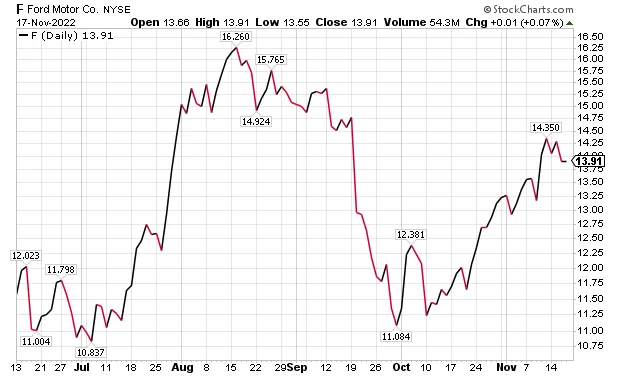Five Electric Vehicle Income Stocks to Consider Offer Alternatives to Tesla
By: Paul Dykewicz,

Five electric vehicle income stocks to consider offer alternatives to Tesla Inc. (NASDAQ: TSLA).
The five electric vehicle income stocks to consider trade at much lower price-to-earnings (P/E) ratios than Tesla, while offering a chance for capital appreciation due to increases in their respective share prices and dividends that enhance total return. Tesla’s 58.75 price-to-earnings ratio is far more than that of the dividend-paying legacy electric vehicle (EV) stocks like Stuttgart, Germany-based Mercedes-Benz Group AG (OTC: MBGYY), 5.89; Detroit-based General Motors (NYSE: GM), 6.99; Dearborn, Michigan-based Ford Motor Co. (F), 6.45; Toyota City, Japan-based Toyota Motor Corporation (NYSE: TM), 11.55; and Maranello, Italy-based Ferrari N.V. (NYSE: RACE) 42.86.
When asked directly why investors would buy shares of non-dividend-paying Tesla at its much higher P/E valuation rather than dividend-paying EV competitors, its founder and Chief Executive Officer Elon Musk told attendees at the recent Baron Funds Investment Conference in New York that he advised the investing public in the past that Tesla shares were too high, “and they ignore me and buy the stock anyway.”

Chart courtesy of Stock Rover. Learn more about Stock Rover
Five Electric Vehicle Income Stocks to Consider Feature Legacy Manufacturers
Musk, a serial entrepreneur, used self-deprecating humor amid while analyzing business and technology challenges. I attended the event and witnessed Musk show restraint when responding to questions about the valuation of Tesla, his market-leading electric vehicle company, as well as his newly acquired social media company, Twitter Inc. (NASDAQ: TWTR).
His “surprise” appearance at the Baron Funds conference on Friday, Nov. 4, gave Musk an opportunity to offer updates and respond to queries on the same day about both of the large public companies he controls and now leads. His interview at the Metropolitan Opera House with Ron Baron, chief executive officer of Baron Capital, the holding company of Baron Funds, and portfolio manager of Baron Partners Fund and Baron Focused Growth Fund, occurred the day Twitter announced plans to cut roughly 3,700 jobs, or almost half its workforce. He also discussed SpaceX, his privately held rocket launching and broadband satellite services company.

Paul Dykewicz meets with Ron Baron, CEO of Baron Capital
Five Electric Vehicle Income Stocks to Consider Other than Tesla
Tesla’s share price dropped after the company voluntarily recalled 40,168 of its 2017-2021 Model S and Model X electric vehicles on Oct. 25 due to the risk that they could incur a loss of the power steering assist system (EPAS), according to a Nov. 1 filing with the National Highway Traffic Safety Administration. The recall, announced on Tuesday, Nov. 8, contributed to Tesla’s stock slipping to a 52-week low of $177.59 per share.

Chart courtesy of www.stockcharts.com
Tesla’s mission statement is to accelerate the “world’s transition to sustainable energy,” and the company is causing its dividend-paying industry rivals to follow suit. The largest shareholder of Tesla is Baron Funds, so Musk agreed to take a red-eye flight to appear at the company’s recent conference in New York. Musk, who has been described as a “modern-day Leonardo de Vinci,” told the audience of about 5,000 attendees that he believed Tesla has significantly “accelerated the advent of sustainable energy.”
“Before Tesla, no one was doing electric cars,” Musk said in response to a question from Baron. “As a result of Tesla, almost every major car company in America is building electric cars.”
After Baron’s half-hour interview with Musk ended, the fund company chief called on Mark Skousen, a major investor in Baron Funds and leader of the Forecasts & Strategies investment newsletter, to ask a question.

Elon Musk is interviewed by Ron Baron.
Why Not Invest in Mercedes-Benz, a Major Baron Funds Investor Asked Musk?
Skousen began by quoting the Roman philosopher Seneca, saying, “There is no great genius without a touch of madness.” Musk responded humorously, “I like the madness part.” Then Skousen asked Musk if Tesla, of Austin, Texas, trading then at 70 times earnings, rather than dividend-paying Mercedes-Benz (OTC: MBGAF), selling for five times earnings. Both companies sell electric vehicles. As this video of the half-hour interview shows, Musk did not disagree with the analysis.

Mark Skousen has post-conference conversation with Ron Baron.
Mercedes-Benz, an industry leader in luxury vehicles, is delivering “blockbuster sales and earnings,” Skousen advised his Home Run Trader advisory service subscribers in his latest update. Skousen, who also is a presidential fellow in economics at Chapman University and the school’s inaugural Doti-Spogli Chair in Free Enterprise, recently recommended Mercedes-Benz to his Home Run Trader subscribers.

Chart courtesy of www.stockcharts.com
Mercedes-Benz Stands Out as One of Five Electric Vehicle Income Stocks to Consider
Mercedes-Benz is one of the world’s preeminent luxury car companies and sells vehicles almost worldwide, Skousen wrote to his Home Run Trader subscribers. The company also offers financing, leasing, car subscriptions, fleet management, digital services and insurance brokerage options.
“Traditionally, Mercedes has sold only gas-powered cars, but that is rapidly changing,” Skousen opined. “Its sales of electric cars surged 64% last year, and Mercedes achieved several technological milestones.”
Mercedes introduced four electric vehicles and gained the first international system approval for SAE-Level Three automated driving. Indeed, the company is rolling out a raft of new electric vehicles this year and beyond.
Despite an ongoing semiconductor shortage and bottlenecks in logistics, third-quarter earnings at Mercedes soared 59% on a 19% increase in sales, Skousen noted. The manufacturer found “particularly robust demand” for its premium models and electric vehicles, he added.
Demand continues to outstrip supply, Skousen continued. With the global supply chain returning to normal in the months ahead, Mercedes is well positioned to capitalize on future sales growth, he observed.
Acquisition May Aid One of Five Electric Vehicle Income Stocks to Consider
In October, Mercedes finalized a supply agreement with Rock Tech Lithium to secure the high-quality lithium needed in battery production. This will allow it to rapidly scale up its production of fully electric vehicles.
Despite high inflation and interest rates, retail data so far show highly affluent consumers are not cutting spending. Essentials make up a small percentage of their total spending, so the well-heeled consumers have money to spurge on luxury goods, Skousen commented.
Skousen has recommended Tesla profitably twice in the past in one of his trading services but opined that he now sees better value in Mercedes-Benz. In 2020, Skousen recommended that his subscribers buy Tesla, then later recommended selling half of the stock on Feb. 4, at $912.16 for a 58.07% gain. The remainder stopped out on Feb. 5 at $823.39 for a 42.69% profit.

Risks that could hurt GM include a material downturn in U.S. auto sales, a sustained rise in input costs, disruption in the supply base, significant increase in gas prices, unwillingness of dealers to shoulder inventory risk, suppliers gain significant pricing power, increased borrowing costs and departures of key company leaders. Potential catalysts for the share price include continued strength in the U.S. auto cycle, growth in China staying robust, benefiting GM through its established market position, favorable product and pricing mix, capital allocation aiding shareholder returns through measures such as share repurchases.

Chart courtesy of www.stockcharts.com
Ford is One of Five Electric Vehicle Income Stocks to Consider
BofA placed a $28 price objective on Ford, indicating a valuation toward the higher end of the company’s historical range of 3-6 times earnings. The investment firm wrote that Ford is strengthening its core business pillars to fund its future growth.
Risks to Ford include a downturn in U.S. auto sales, a sharp and sustained rise in input costs, disruption in the supply base, significant increase in gas prices, any market share losses, unwillingness of dealers to accept inventory risk, suppliers wielding pricing power, increased borrowing costs and incremental execution risk. Potential catalysts include continued strength in U.S. auto cycle, growth in China remains robust that Ford is pursuing with product launches, favorable produce and pricing mix and using stock buybacks and other methods to return capital to shareholders.

Chart courtesy of www.stockcharts.com
“Ford’s EV sales increased 120% over the 12 months ending October 2022,” Carlson said. “Ford introduced its electric version of the popular F-150 pickup truck only in May but has sold more than 11,000 electric pickup trucks so far in 2022.”
Ford’s F-150 Is Among Keys to Its Place in Five Electric Vehicle Income Stocks to Consider
Plus, Ford is the second-largest seller of EV vehicles in United States, trailing only Tesla. In addition, Ford and GM are looking at investing in a South Korea EV battery manufacturer: Posco Chemical.

Michelle Connell, CEO, Portia Capital Management
Despite Ford ‘s October sales down 10% year-over-year, the company is considered to have one of the strongest brand loyalties of any U.S. vehicle manufacturer, Connell continued. If the Federal Reserve is at the tail end of its rate-heightening cycle, sales of Ford vehicles could stabilize, she added.
During past economic recessions, sales of Ford vehicles remained stronger compared to their U.S. competition, Connell commented. Ford’s share price decline so far this year has led some observers to consider the stock cheap, she added.
Ford’s price-to-earnings (P/E) ratio is only 6.5. The company’s price to sales ratio is .39.
The estimated 12-month upside for the stock is 20-25%, Connell counseled.
“I would suggest dollar cost-averaging for purchases of Ford shares,” Connell said. “The company has continued to have supply concerns – specifically for computer chips. There could be future weakness due to new announcements regarding this issue.”
Toyota Joins Pack of Five Electric Vehicle Income Stocks to Consider
Toyota joined with other Japanese companies and their government this month to form a new company named Rapidus to develop and manufacture computer chips, as well as advance the cultivation of human resources in the semiconductor industry in country. The main goal of Rapidus appears to be alleviating a global shortage of the precious computer chip technology to produce sub-2-nanometer semiconductors by the late 2020s.
Japan companies only are producing much bigger chips of 40 nanometers. The smaller and more capable the computer chips, the better.
Other big Japanese companies involved in helping to fund the launch of Rapidus include Sony Group Corp., SoftBank Corp. and Nippon Telegraph and Telephone Corp., as well as semiconductor maker Kioxia Corp., auto parts supplier Denso Corp., electronics maker NEC Corp. and MUFG Bank.

Chart courtesy of www.stockcharts.com
Ferrari Fits in With Five Electric Vehicle Income Stocks to Consider
Ferrari received a $285 price objective from BofA, offering a slight premium to RACE’s current trading level due to ongoing volume, sales and earnings growth. This valuation is also supported by a discounted cash flow (DCF) analysis, BofA wrote in a recent research note. The multiples used for BofA’s valuation are a premium to the current trading range of a number of luxury companies in RACE’s peer group, but warranted, given Ferrari’s outsized growth opportunity, according to the investment firm.
Risks include devaluation of the brand due to overproduction or licensing expansion, any perceived vehicle quality or performance shortcomings, impairment of Ferrari’s Formula 1 reputation or perceived racing pedigree, F-1 losses persist, deterioration in related businesses and intensifying competition in the luxury vehicle market, BofA wrote. Further risks are dependence on certain large volume suppliers, significant rise in raw material costs and significant voting power and control attributable to Piero Ferrari & Exor S.p.A.
Possible catalysts include modest volume expansion, an upward bias on pricing, growth in related businesses, gradual brand and licensing extension, moderation of F-1 losses, execution and cost efficiency realization, as well as management preserving the company’s luxury culture, according to BofA.

Chart courtesy of www.stockcharts.com
“In the near term, I expect the legacy auto makers’ stocks to do poorly because of slower economic growth and rising interest rates,” Carlson said. “But they’re already down significantly in 2022 and will have strong returns once the economy turns up.”
Bivalent COVID-19 Vaccine Offers Heightened Protection Against New Variant
A new bivalent COVID-19 booster in the United States offers protection against the omicron BA.5 variant, now the predominant strain of the virus. I received the new booster on Oct. 16 after it became available at pharmacies near my house.
However, there remain 200-plus million Americans who are eligible but have not yet availed themselves of the opportunity. New cases and deaths can hurt businesses such as Tesla, Mercedes-Benz, General Motors, Ford, Toyota and Ferrari, so availability of a bivalent booster to enhance the vaccine’s efficacy could help both public health and the economy.
Cases in the country totaled 97,990,681 and deaths reached 1,074,524, as of Nov. 11. America has the dubious distinction of amassing the most COVID-19 cases and deaths of any nation. Worldwide COVID-19 deaths totaled 6,609,120, as of Nov. 11, according to Johns Hopkins. Global COVID-19 cases reached 634,710,643.
Roughly 80.4% of the U.S. population, or 267,032,055, have received at least one dose of a COVID-19 vaccine, as of Nov. 9, the CDC reported. People who received the primary COVID-19 doses totaled 227,802,408, or 68.6%, of the U.S. population, according to the CDC. The United States also has given a bivalent COVID-19 booster to 30,295,463 people who are age 18 and up, accounting for 11.7% of the U.S. population in that age range. The latter total shows a gain of nearly 5 million in the past week.
Valuation is a Big Final Factor for Five Electric Vehicle Income Stocks to Consider
Valuation stands out as one of the most important fundamental factors that should be considered when making investment decisions about vehicle manufacturers, according to BofA. Given the “extreme volatility” in certain links of the automotive value chain, investors should beware that the stocks are sensitive to headlines and swings in expectations, especially in the short term.
For investors seeking income and the best value among EV stocks, legacy manufacturers deserve a close look. However, non-dividend-paying Tesla’s valuation has fallen in recent days and Musk’s sale of $4 billion in the company’s stock to help fund his $44 billion acquisition of Twitter (NYSE: TWTR) is one of the key reasons.
Russia’s protracted war against Ukraine and lingering recession risk after four consecutive 0.75% rate hikes by the Fed in June and July, as well as on Sept. 21 and Nov. 2, add uncertainty for investors. But the payment of dividends forces management teams to stay disciplined and offers potent potential to profit if inflation is curbed.











